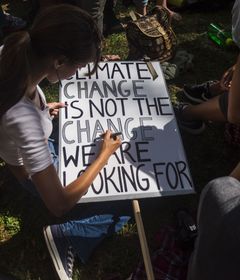



What to expect?
We open the LIVECAST with a short introduction on the how and why of the international research project “Climate Citizens’ Assemblies: learning with, from and for Europe”. We do so with Eva Rovers, cultural historian, co-founder of Bureau Burgerberaad (The Citizens’ Assemblies Bureau), and co-initator of the research project.
We then dive into the experiences of various European practices with Citizens’ Assemblies, and the insights they have learned throughout the process. We will talk with experts from:
- IRELAND is considered by many to be a model when it comes to deliberative democracy in Europe. In 2016, the political commentator David Van Reybrouck even referred to Ireland as “the most innovative democracy in Europe”, due to the succesfull experiment of the country with Citizens’ Assemblies between 2016-2018. At that time, 100 loted citizens came together to consider issues as referenda, climate change, and an ageing population. Their conclusions were submitted to the National Parliament, for further debate by the elected representatives. Untill this day, Ireland still continues with Citizens’ Assemblies, such as the one on gender equality that started in July 2019.
A key player within this process is Art O’Leary, the Secretary General to the President of Ireland -one of a group of senior state officials and chief advisor to the President. He will join us during the meeting to share his experiences with the Citizens’ Assemblies in Ireland. How did this relatively unknown democratic instrument became the way to go in Ireland? How was the political follow-up of the outcome of the Assemblies organized?
- POLAND started its first and most famous Citizens’ Assembly in 2016, in Gdansk. When the city was struck by major flooding after extreme rainfall, the mayor agreed to bring approximately 60 randomly-selected residents together to hear from experts and come up with solutions. Decisions with at least 80% support among its assemblies’ members would be enacted in law. The experiment turned out to be a success, and was followed by other citizens’ assemblies both in Gdansk and in other Polish cities, on issues such as pollution, civic engagement and LGBT rights.
Joining us is Marcin Gerwin, a specialist in sustainable development and deliberative democracy and the person that was able to convince the mayor of Gdansk to start the first Citizens’ Assembly in Poland. He designs and coordinates various citizens’ assemblies in Poland, and is author of a.o. the ‘Guide to citizens’ assemblies‘. How does he explain the position of this form of deliberative democracy in Poland, and how has it helped to make issues such as climate change rise on the political agenda?
- THE UNITED KINGDOM started it’s first nationwide citizens’ assembly on climate change in January 2020: the Climate Assembly UK. It brought together 100+ people to discuss how the UK could meet its commitment of reaching net zero greenhouse gas emissions by the year 2050. They came together (online, due to the covid-19 pandemic) over six weekends, and published its report with recommendations in September 2020.
Joining us is Kathie Conn, activist and external coordinator of the Citizens’ Assembly Working Group of Extinction Rebellion UK. The movements’ Third Demand (besides: Tell the truth, and Act now) is a government commissioned, independently run Citizens’ Assembly on Climate and Ecological Justice, in order to empower citizens to take the lead in dealing with the climate and ecological emergency. Why are Climate Citizens’ Assemblies the way to go, for both our democracy and our climate? And what is the role of grass roots organisations in getting (proper) CCA’s?
About the project
This LIVECAST is the first of a series connected to the international research project “Climate Citizens’ Assemblies: learning with, from and for Europe”. From April – September 2021, Pakhuis de Zwijger and Bureau Burgerberaad join forces to investigate how Citizens’ Assemblies can help us strengthen democracy and fight climate change.
Through the development of an online knowledge platform, and by bringing different keyplayers from Europe together in LIVECAST sessions, the project aims to exchange knowledge and best practices, enhance collective learning and develop guidelines for impactful and just implementation of Climate Citizens’ Assemblies in Europe. With as overall goal: to contribute to effective, sustainable and just climate policies and a 21st century proof democracy in Europe


In deze podcast spreekt Annick van Rinsum met Eva Rovers over wat burgerberaden onze democratie te bieden hebben en wat de vereisten zijn om ze tot een succes te brengen, over een burgerberaad voor klimaat in Nederland, en over de kennis en betrokkenheid die schuilgaat achter de boze burger. >>>

Among democratic innovations, deliberative mini-publics, that is panels of randomly selected citizens tasked to make recommendations about public policies, have been increasingly used. In this regard, Ireland stands out as a truly unique case >>>

Big changes are underway in Gdansk, Poland today. Since July 2016, some of the city’s most vexing problems have been dealt with calmly – even enjoyably — by a changing, randomly-selected “citizens assembly” made up of approximately 60 ordinary city dwellers, who are brought together and given the authority to take action. >>>

Extinction Rebellion UK's Third Demand is a government commissioned, independently run Citizens' Assembly on Climate and Ecological Justice. But what does that mean? >>>








